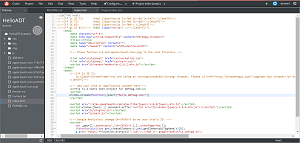News
Codio Cloud-Based IDE Emerges from Beta
- By David Ramel
- June 26, 2014
The Codio cloud-based development platform yesterday emerged from beta status, letting programmers write and execute code for free just using a Web browser.
Among dozens of similar products, Codio differentiates itself by offering instant, dedicated virtual servers for each project, according to a statement from owner Application Craft Ltd.
That enables developers -- from amateur hobbyists to professional teams -- to use almost any language to create front- and back-end applications.
On the front-end, apps are developed using HTML5, CSS and JavaScript. On the back-end, many of the 40,000 users who have already signed on have been using NodeJS, Ruby, PHP, Go, Haskell, Ocaml and others, the company said.
The dedicated back-end servers -- called Boxes -- are Ubuntu instances preinstalled with NodeJS, Ruby, Python, Git, Mercurial and SVN.
If you want more, a Box Parts feature lets you add other languages such as C, Java, Lua, Pascal, Rust, Scala and more. Databases such as MongoDB, MySQL, Redis, Memcached and more can also be added. Other Web servers, middleware and components can also be added with a single command.
 [Click on image for larger view.]
It took just a few minutes to sign up, launch a boilerplate HTML5 project, add a JavaScript alert and run it.
[Click on image for larger view.]
It took just a few minutes to sign up, launch a boilerplate HTML5 project, add a JavaScript alert and run it.
"For example, 'parts install php5 mysql apache2' is all that's needed to install a complete LAMP stack in about 20 seconds," the company said. "Codio's collaboration features allow a project owner to grant access to others, who can then instantly access, edit and execute that user's project without any local stack setup."
Boxes are limited to 512MB and users are allowed a "soft" limit of 16GB of storage aggregated across all projects, with higher storage and memory configurations coming soon, a FAQ said.
Using Codio -- which went into beta in March 2013 -- is free for one private project and unlimited public and open source projects, while an $8 monthly subscription is required for private projects and Boxes.
In a discussion on Hacker News, one poster wondered what the use cases for Codio could be, and he was answered by Codio developer Joel Moss.
"Primarily it means you have no stack to install and configure, as Codio Boxes provide all that for you," Moss replied. "Also, you will find that server development is much faster, as the connection between Codio Boxes and the Internet is much faster than that of your desktop.
"Other advantages include collaboration, teaching/learning and, of course, no need to install or keep anything updated on your desktop -- other than your browser, of course," Moss concluded.
Among many similar products, Hacker News posters mentioned Cloud9 and Nitrous.IO.
Over on Quora.com, a question about the best Web-based IDEs received recommendations for Codio and alternatives such as Codenvy, eXo Cloud IDE, Koding and several others.
About the Author
David Ramel is an editor and writer at Converge 360.